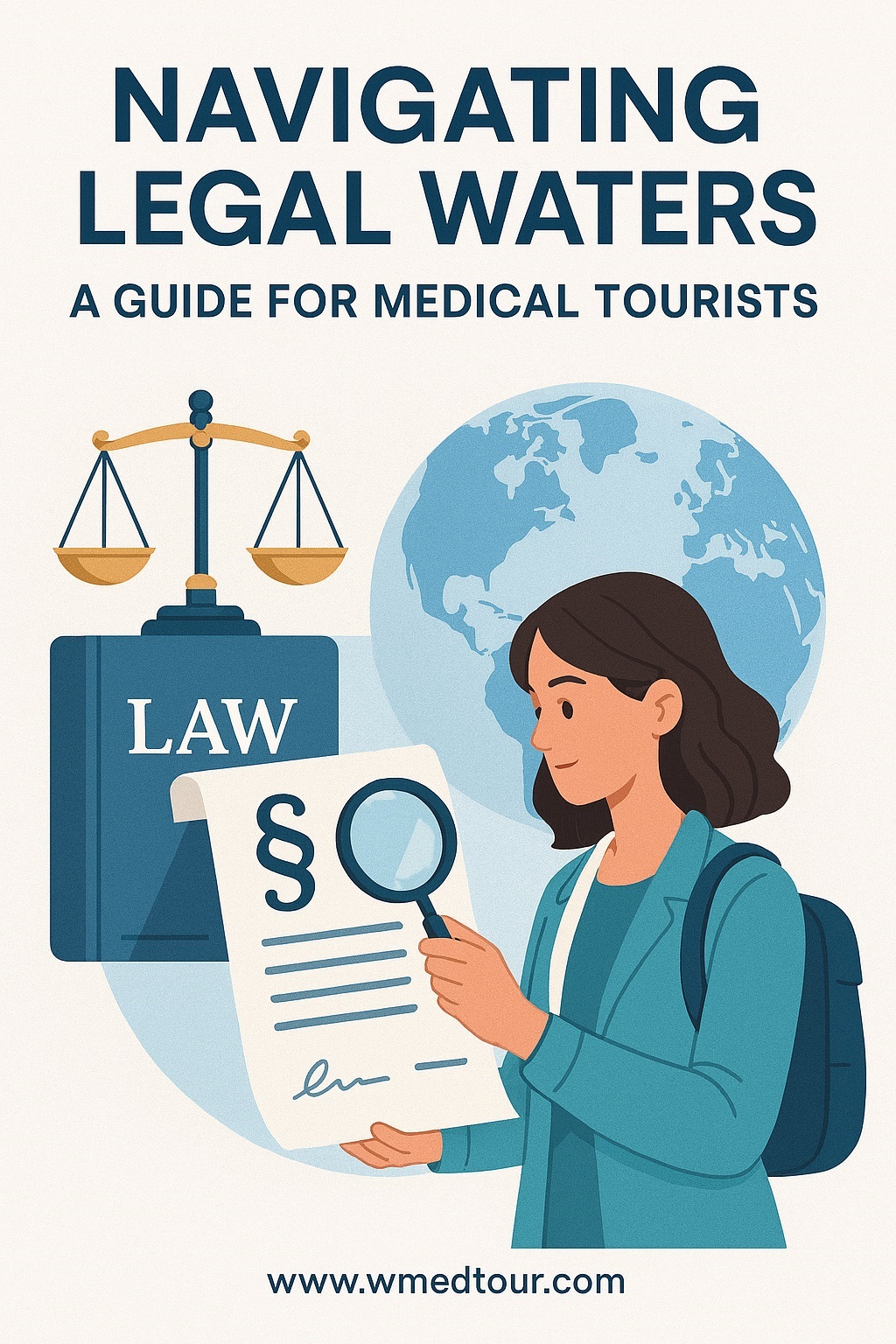Medical Tourism Legal Considerations: A Guide for 2025
Navigating **medical tourism legal considerations** is a crucial step for a secure medical journey. Traveling for a medical procedure offers access to high-quality care at an affordable price; however, it also involves a complex legal landscape. At Wmedtour, we believe that understanding your legal rights and protections is just as important as selecting the right treatment. Our comprehensive 2025 guide will walk you through the key legal aspects of medical tourism to ensure a safe and secure experience. We’ll explore everything from patient rights to malpractice recourse and the indispensable role a trusted agency can play in your journey. In essence, our goal is to empower you with knowledge.
Understanding Patient Rights and Legal Protections
When you travel for medical treatment, your legal rights may differ significantly from those in your home country. It’s important to research the laws of your destination to understand your standing. This includes local healthcare regulations and the legal framework for international patients. Laws related to medical malpractice, liability, and patient privacy can vary considerably between countries. Consequently, the legal protections you have at home might not apply abroad. Therefore, you must take a proactive approach to your legal safety. In other words, informed decisions are your best defense.
Informed Consent: Your Right to Know
Informed consent is a fundamental patient right. This means that before any procedure, a doctor must provide you with all necessary information about your treatment. You should be fully informed about the potential risks and benefits, alternative treatment options, and the expected outcomes of the procedure. Furthermore, it is essential that this information is provided in a language you can fully understand. Don’t be afraid to ask for a professional translator or to have the documents explained to you in detail. Only after you have a complete understanding should you sign any consent forms. A recent study from the Vital Global Care highlights that a lack of clarity in consent forms is one of the top legal challenges faced by medical tourists. Therefore, you must be proactive in your questions and ensure you are comfortable with every aspect of the proposed treatment before proceeding. In short, clarity is key. These are key **medical tourism legal considerations** to remember.
Malpractice and Legal Recourse
While the goal is always a successful outcome, it’s important to be prepared for all possibilities, including complications. The legal process for seeking recourse in a foreign country can be complex and challenging. Your options may include filing a complaint with a local medical board or pursuing a civil lawsuit. The jurisdiction for such cases can be a major hurdle, as it can be difficult to sue a foreign doctor in a domestic court. As explained by legal experts at Enjuris, even if jurisdiction is established, enforcing a judgment may be nearly impossible. Wmedtour partners with accredited hospitals and clinics that adhere to international safety standards, minimizing these risks. In the unlikely event of an issue, we can provide guidance on navigating local legal systems. We recommend consulting with a legal professional who specializes in international law to better understand your options.
The Role of Medical Tourism Agencies: Your Advocate Abroad
A reputable medical tourism agency like Wmedtour can be your strongest ally. Agencies often act as a liaison between the patient and the healthcare provider. We help you with administrative tasks, like securing appointments and travel logistics. Additionally, we provide crucial support in understanding the legal agreements and contracts from the hospital. Our role is to facilitate a seamless experience while ensuring all parties are aware of their responsibilities. Our extensive network allows us to connect you with trusted healthcare providers that prioritize patient safety and legal compliance. It is in this way that we empower you.
Wmedtour also assists in preparing all the necessary documents for your medical journey. This includes medical records, visa applications, and other official paperwork. This level of support helps you focus on your health. By managing these critical details, we aim to reduce the stress and complexity often associated with medical travel. In light of these **medical tourism legal considerations**, we are committed to making your experience safe and legally secure. We invite you to contact us for a personalized consultation. Our team is ready to answer your questions and guide you through every step of your journey.
Ready to begin your medical journey with confidence? Click here to start a personalized consultation with a Wmedtour specialist today!
Comparison of Legal Frameworks
To highlight the differences in legal protection, here is a general comparison of Iran and other popular medical tourism destinations. This table is for informational purposes only and should not be considered legal advice. Ultimately, it offers a glimpse into key **medical tourism legal considerations** across different countries.
| Aspect | Iran | Turkey | Thailand |
|---|---|---|---|
| Patient Rights | Comprehensive patient rights regulations, including the right to information, consent, and privacy, governed by the Ministry of Health. | Strong regulations under the 2025 Regulation on International Medical Tourism, focusing on authorized intermediaries and patient safety. | Patient rights enshrined in the National Health Act of 2007, with a focus on informed consent and quality of care. |
| Medical Malpractice | Recourse is available through legal channels and medical commissions, which handle malpractice claims. | Legal recourse is possible, but the process often involves an expert committee opinion before litigation. Damages can be capped. | Recourse is challenging; lawsuits can be lengthy. Many cases are handled through mediation or arbitration. |
| Accreditation | Accreditation is overseen by the Ministry of Health and Medical Education. Some hospitals are ISO-certified. | Mandatory certification by the state-affiliated USHAS (“HealthTürkiye”) for all medical tourism providers as of 2025. | Many hospitals hold international accreditation from bodies like the Joint Commission International (JCI). |
| Regulatory Oversight | The Ministry of Health and Medical Education, along with the Medical Council, provides direct oversight of all healthcare facilities. | Centralized oversight through the Ministry of Health and USHAS, with mandatory compliance checks and audits. | The Ministry of Public Health and professional councils provide oversight, with a push towards self-regulation within private hospitals. |
Frequently Asked Questions (FAQ)
What is informed consent in medical tourism?
Informed consent is a patient’s legal right to receive all the necessary information about a medical procedure before agreeing to it. This includes understanding the risks, benefits, and alternative treatments, as well as the costs and expected outcomes. The patient must understand the information in their native language to give valid consent.
How can a medical tourism agency help with legal issues?
A reputable medical tourism agency, like Wmedtour, can serve as a crucial intermediary. We assist by vetting hospitals for legal compliance and helping you understand the legal contracts and agreements. While we are not a law firm, we can provide guidance on legal processes and connect you with appropriate legal professionals if a dispute arises. In short, we simplify the complex process.
What should I do if a medical procedure goes wrong abroad?
If you experience an adverse outcome, it is important to first secure your immediate medical safety. Then, you should contact the medical tourism agency, if you used one, to initiate a formal complaint with the hospital. You may also need to seek independent legal counsel in the country where the procedure took place to understand your options for legal recourse, such as a lawsuit or a complaint to a medical board. Therefore, having a plan is essential.
What are the primary risks associated with medical tourism?
According to the CDC (Centers for Disease Control and Prevention), the primary risks include a higher chance of infectious diseases, continuity of care issues upon return home, and complications from air travel immediately following a procedure. It’s crucial to follow all post-operative instructions carefully. In short, proper planning is your best defense against these risks. This is another one of the major **medical tourism legal considerations** to take seriously.
Does my domestic insurance cover medical treatments abroad?
Most domestic health insurance plans do not cover elective procedures or complications from procedures performed outside of your home country. It is essential to check with your insurance provider and consider purchasing supplemental medical travel insurance that covers potential complications and medical evacuation. This is one of the most important **medical tourism legal considerations** to make.




